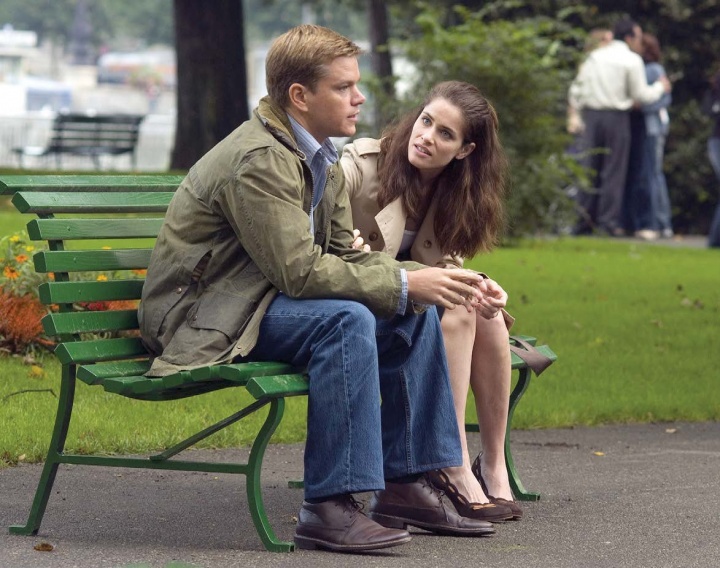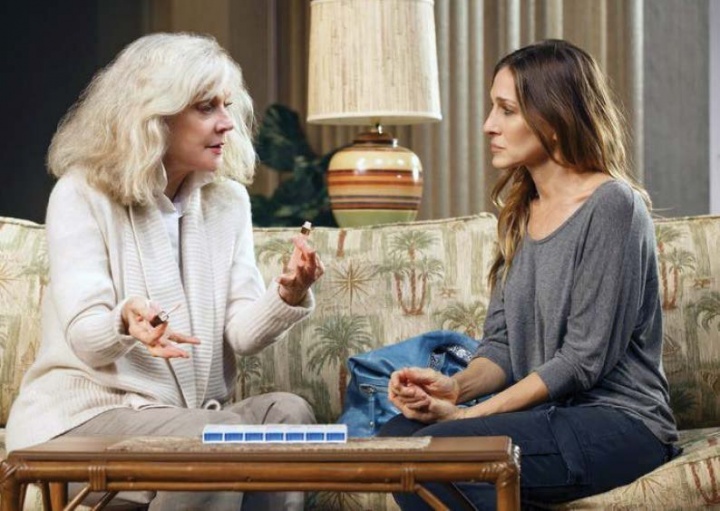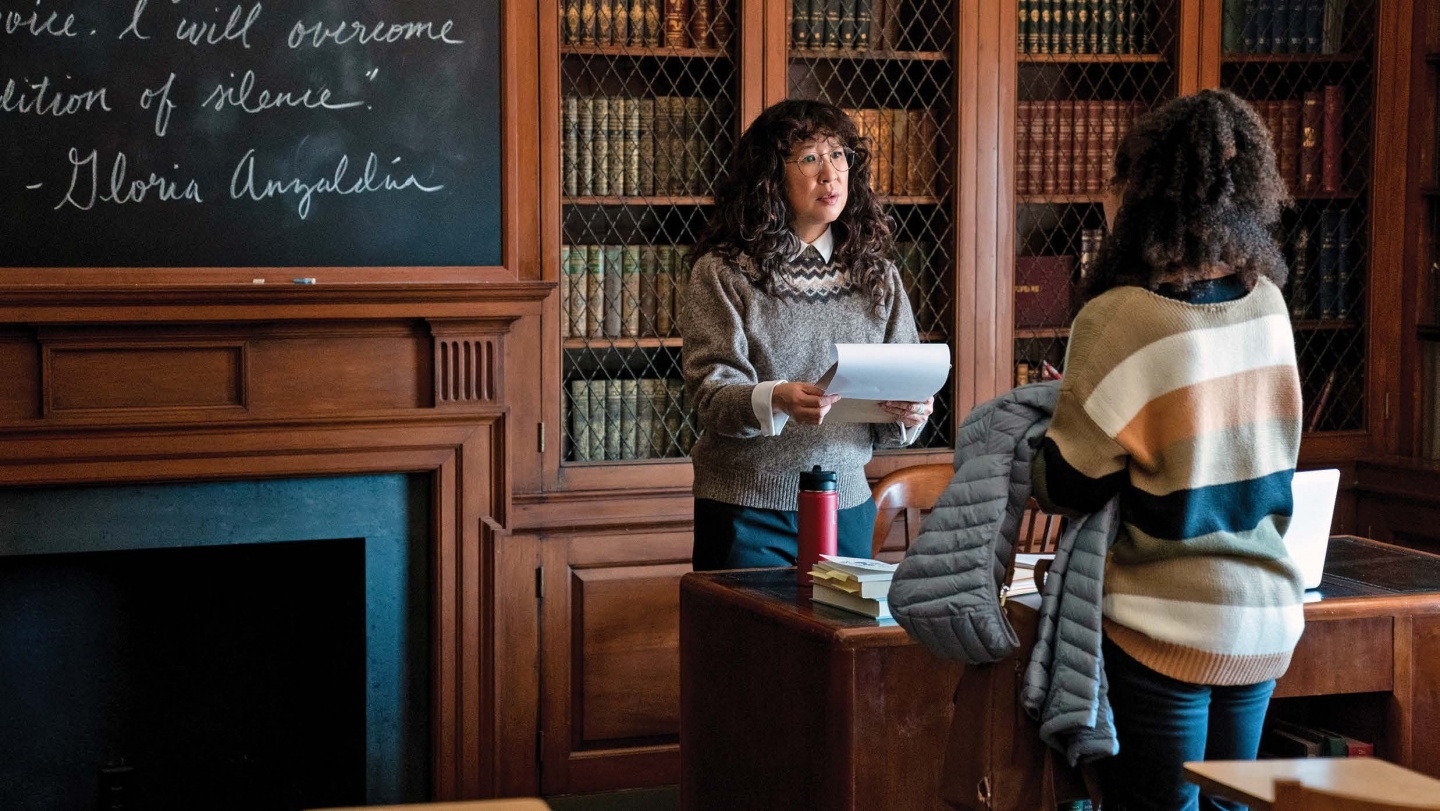Actress Amanda Peet ’94 “recognizes the joy” of writing as co-creator of The Chair.
Columbia College | Columbia University in the City of New York
Actress Amanda Peet ’94 “recognizes the joy” of writing as co-creator of The Chair.

Peet photographed in Los Angeles for Emmy magazine in January 2020.
ELISABETH CAREN / CONTOUR RA BY GETTY IMAGES
On its face, the conversation was less than promising. “He was ... fairly harsh,” says Peet, recalling Benioff’s candid breakdown of the numerous places where he felt her writing was lazy or thin.
You might think that receiving this particularly withering feedback, from this particularly qualified source, would be enough to make someone hang up their pen and notebook for good. For Peet — after she “cried in the corner,” she allows — it was exactly what she needed to confirm she was on the right track. “I took it as a huge compliment,” says Peet. “It felt like he thought I had potential. If he didn’t, he would have just sweet-talked me. And then he would have been like, ‘What about that part they offered you on NCIS?’”
What a difference a decade makes. Last summer, Peet debuted The Chair, a Netflix series she co-created with Harvard academic-turned-screenwriter Annie Julia Wyman. She also co-wrote the first three episodes.
If the old saying is “write what you know,” Peet didn’t need to look too far for inspiration. The Chair is set at Pembroke, a (fictional) East Coast university, and creating it led Peet to reflect on her own years at the College, in the early ’90s. It was a creatively diverse and fulfilling time in her life. After letting her interests dictate the classes she took the first two years, she says, she belatedly decided to major in American history because she realized it was the only field in which she already had enough credits to graduate on schedule.

Peet with Matt Damon in a scene from the 2005 film Syriana.
GLEN WILSON
It wasn’t long before Peet booked parts with a little more rigor, including an Off-Broadway role in the revival of the Clifford Odets play Awake and Sing! But even as her acting career started to take off, Peet was nagged by the road she hadn’t taken: as a writer, building on the short stories she’d quietly worked on since college. When asked why she didn’t continue to write, even while pursuing acting, Peet pauses and thinks for a long time before answering. “I am haunted by that question,” she finally says. “I don’t know. I don’t understand why I didn’t recognize the joy that I was finding in it.”
In the years that followed, the question never quite faded away, until Amanda Peet, Actress, finally decided it was time to make room in her life for Amanda Peet, Writer. With the encouragement of family and friends, Peet developed an unusual creative process: sitting not at a desk but on the floor, for hours and hours, hunched over her laptop as she worked out dialogue, characters and plots. Whenever she finished something, she would print it out and read it, only trusting her eye for self-critique when she could see her words on an actual piece of paper. “I’ll look at it on the computer and I’ll say, ‘God, this is so brilliant. I can’t believe how good I am.’ And then, when I print it out, I see that it’s dreck,” she says.
Any career in writing comes with a fair amount of rejection, and Peet’s was no different. After NBC’s Studio 60 on the Sunset Strip, in which she had a lead role, was canceled in 2007, Peet wrote a TV script with her friend Andrea Troyer, wife of Benioff’s Game of Thrones co-creator D.B. Weiss. Nobody bit. She wrote a pilot with Benioff; that didn’t go anywhere either. She even wrote an unproduced play set at Columbia in the mid-’90s, with a story that took place during a single night in the dorms. That one made it as far as workshops, but Peet sounds skeptical about revisiting it now: “David and I talk a lot about the dangers of going back to some of your earlier work. Sometimes there’s a reason something didn’t achieve liftoff.”

Blythe Danner and Sarah Jessica Parker in The Commons of Pensacola (2013). The Off-Broadway dramedy was Peet’s play-writing debut.
JOAN MARCUS
It’s an interesting quirk that while most of Peet’s works feature at least one character she could clearly play, she has never actually acted in something she’s written. For now, at least, the two sides of her career remain separate. “I always start out writing for myself, and then I get to a certain place — and then I can’t do anymore, for lack of inspiration. And then, as soon as I think of the right actor, I can keep going,” she says.
The Chair was no different. The series came, in part, out of Peet’s frustration over the abrupt cancellation of the HBO show Togetherness, in which she starred for two seasons. The series was co-created by brothers Mark and Jay Duplass, and Peet felt her work with them wasn’t finished. Switching back to her writer’s hat, she began imagining a romantic comedy with Jay Duplass in mind as the lead, building out the premise from a vague, unformed idea about a widower who starts to date again as his daughter goes off to college.
“I always start out writing for myself, and then as soon as I can think of the right actor, I can keep going.”
At the same time, Peet was kicking around a separate idea about a female supervisor trying to navigate her personal and professional life when a male colleague — already a close friend, and possibly something more — transgresses in a way that forces her to act. “How would she feel if she were somewhat in love with this person, and his fate was in her hands?” Peet recalls wondering. “What would she do?”
In one of the lightbulb moments that writers occasionally experience once they’ve spent the proper amount of time hunched over a laptop, Peet realized that her two ideas could be, and should be, the same story. The widower/transgressor would be played by Duplass. For the female lead, she imagined Sandra Oh, and began the almost alchemical process of crafting the series’ arcs with her two ideal actors in mind. “I started watching Sandra’s stuff again, and looking at pictures of her, and looking at pictures of her with Jay, and watching her in interviews, and almost falling in love with her,” Peet says. “It’s like a muse situation. It’s a little bit creepy.”

Sandra Oh plays the head of a fictional English department in Peet’s Netflix drama, The Chair.
ELIZA MORSE / NETFLIX
Though Peet initially thought she might set her story in a hospital, she eventually settled on a university, and enlisted Wyman as her co-creator to ensure she depicted academia authentically. It was, they quickly discovered, a potent breeding ground for natural drama. The buzz inside the English department in The Chair reflects a hornet’s nest of real-life problems that can be found at real-life universities: tensions between long-tenured faculty and new professors interested in shaking up old traditions; disagreements that arise when strong-willed faculty members are challenged by similarly strong-willed students; and difficult choices related to ever-shrinking budgets, especially in a “soft science” department like English that’s increasingly forced to justify its value.
All these topics are united by Oh’s Ji-Yoon Kim, the newly appointed chair who struggles to hold the department together in the midst of a scandal when Professor Bill Dobson (Duplass) sardonically performs a Nazi salute while making a larger point about absurdity and fascism in an English seminar. A clip of the lecture, shorn from its greater context, soon goes viral on social media, creating a scandal that ultimately engulfs the department altogether.
Since The Chair premiered, Peet has heard from a number of actual university faculty and administrators, who are eager to weigh in on how accurately the series reflects their own experiences. “Some people felt like the old people [in the English department] who are so behind the times are clichés. Too cartoonish,” she says. “And then other people said, ‘That’s exactly how it is.’”
The Chair marked Peet’s debut as a showrunner, and for an actress who has spent most of her career getting glammed up for cameras and red carpets, being on the other side of it all proved liberating. “I loved how I got to wear really, really dirty sweatpants every day,” she says. “My hair was a rat’s nest. I felt so guilty rolling in at 6:30 when I knew that Sandra had been in the makeup trailer since 5:45.”
At this point, Peet isn’t sure if The Chair will return for a second season; she has some ideas for where the story might go, but she’s playing those cards close to her vest. But as it becomes clear to Hollywood that Peet is a genuine double threat, she’ll be able to choose which projects she wants to do and whether she wants to be in front of the camera, behind the camera, or both. When asked what, ideally, she’d like to do next, Peet sounds both open-minded and eager to figure it out. “I think the issue is just good writing. Wherever you can find it,” says Peet. And as she’s discovering, the answer might actually be on her own computer screen.
Scott Meslow is a senior editor for The Week magazine and a writer and critic for publications including GQ, Vulture and The Atlantic. His first book, From Hollywood With Love: The Rise and Fall (and Rise Again) of the Romantic Comedy, will be published in February.

Published three times a year by Columbia College for alumni, students, faculty, parents and friends.
Columbia Alumni Center
622 W. 113th St., MC 4530, 4th Fl.
New York, NY 10025
212-851-7852
cct@columbia.edu

Columbia Alumni Center
622 W. 113th St., MC 4530, 4th Fl.
New York, NY 10025
212-851-7488
ccalumni@columbia.edu